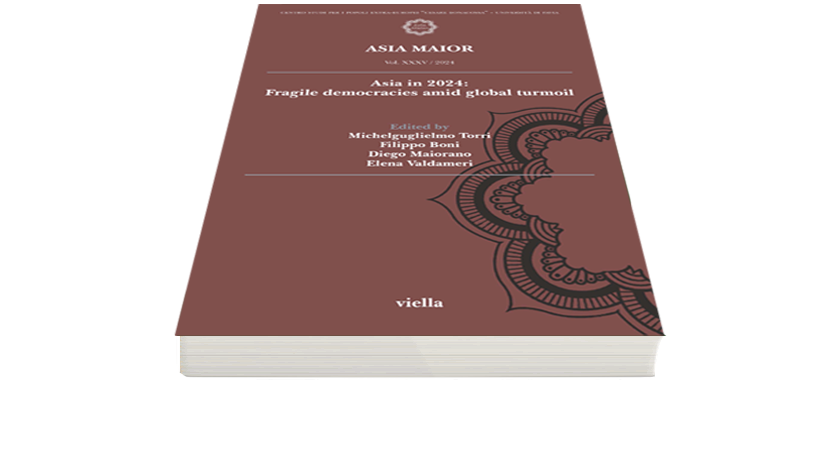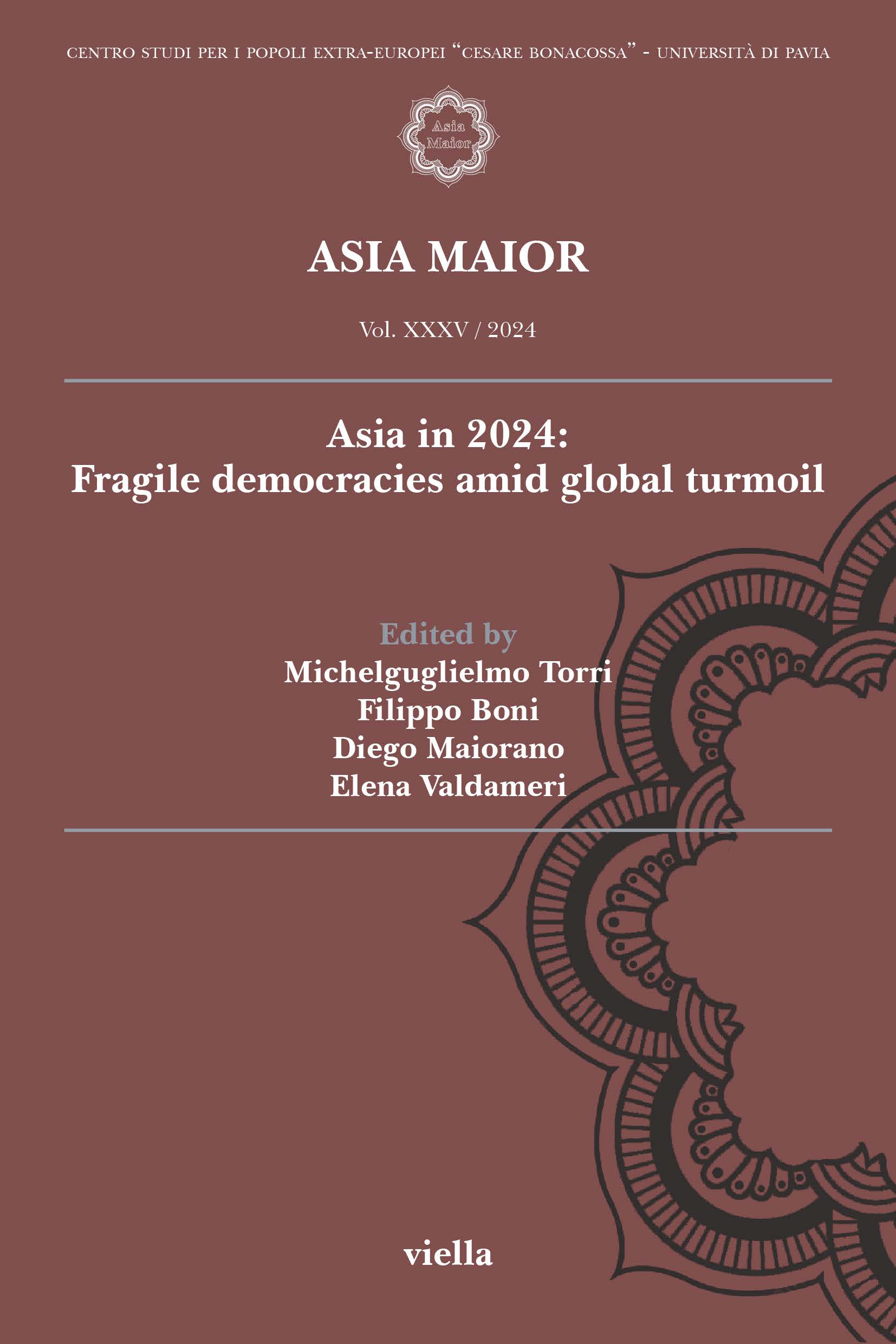Ethical Guidelines
Ethical Guidelines FOLLOWED BY ASIA MAIOR, AN ITALIAN JOURNAL ON ASIA
Asia Maior is an Italian journal on Asia founded by Giorgio Borsa in 1989 [hereafter quoted as AM], owned and published by Asia Maior – An Italian think tank on Asia [hereafter quoted as Association] with the support of the CSPE of the University of Pavia.
AM closely adheres to the Code of Conduct and Best Practice Guidelines for Journal Editors, approved by the COPE Council on 7th March 2011 [hereafter quoted as the COPE Code], including «the more aspirational Best Practice» there indicated (see Pdf: Code of conduct for ournal editors Mar11 ).
The following statement is in the nature of a short introduction to the complete set of ethical guidelines to which AM adheres. Therefore, for a more wide ranging presentation of the complete set of ethical guidelines scrupulously followed by AM, the COPE Code should be consulted. Hence, for any topic that is not dealt in the following statement, the COPE Code applies.
Duties of the Scientific Director, the editorial board and the editors of the Journal
The Scientific and the other editorial organs of AM (which include the Editorial Board and the editor/s in charge of the single issue) are required to respect what is indicated in the COPE guidelines. In particular, the Scientific Director and the other editorial organs of the magazine are solely responsible for the decision to publish the articles submitted to the journal itself. They are guided by the editorial policies of the journal and bound by the provisions of the law in force concerning defamation, copyright infringement and plagiarism. In deciding the publication of each single article, the Scientific Director, and the other editorial organs of AM, in making their decisions, avail themselves of the support of reviewers chosen among renowned scholars, specialists in the topics covered by the single article, according to the procedure of double blind peer review.
The Scientific Director and the other editorial organs of AM are required to evaluate the manuscripts for their scientific content, without distinction of race, sex, sexual orientation, religious belief, ethnic origin, citizenship, or scientific, academic or political orientation of the authors.
The Scientific Director, the other editorial organs of AM and the editorial staff are required not to divulge any information on the manuscripts sent to anyone other than the authors, reviewers and potential reviewers, editorial consultants and the publisher, depending on the cases.
The unpublished material contained in the manuscripts submitted to AM cannot be used by the Scientific Director or by any member of the other editorial organs, or by the members of the editorial staff for their own research, unless a written consent is given by the author/s. If the Scientific Director or any of the editors and members of or Editorial Board detect or receive reports of a significant problem regarding errors, inaccuracies, conflict of interest or plagiarism in a published article, they will promptly notify the author and publisher and take the necessary actions to clarify the issue. If necessary, the Scientific Director will withdraw the article or publish a retraction or Erratum, according to COPE guidelines.
Duties of the referees (peer reviewers)
The referees assist the Scientific Director and the other editorial organs of AM in reaching the final decision about the publication of any given article. They, through the communications conveyed by the editors, may help the authors to improve their manuscript.
The selected referee who does not feel qualified to review the assigned manuscript, or who knows that he/she is unable to perform the review within the required time frame, must notify his/her decision to the editor with whom he/she is in contact, and renounce to participate in the review process. The related editor will immediately communicate the referee’s withdrawal to the Scientific Director and the other editorial organs of AM.
Manuscripts received for review must be treated as confidential documents. They must not be shown or discussed with anyone who is not previously authorized by the Scientific Director.
The review must be conducted objectively. Personal criticism of the author/s is not allowed. The referees must express their opinions clearly and with the support of clear and documented arguments.
The referees have the task of identifying the presence of bibliographic material relevant to the work to be evaluated but not mentioned by the authors. Each statement, remark or argumentation must preferably be accompanied by a corresponding quotation.
The referee should draw the attention of the editor with whom he/she is in contact if he/she finds a substantial similarity or overlap between the manuscript under examination and any other published document of which he/she has personal knowledge. In turn, the editor will forward the referee’s indication to the Scientific Director and the other editorial organs of AM.
The information or ideas obtained through the revision of the manuscripts must be kept confidential and not used for personal gain or advantage or inserted in a work by the referee, unless written permission is obtained by the author/s.
The referees must not accept manuscripts in case there is a conflict of interest deriving from relations of competition, collaboration, or other type of connection with the authors and/or the institutions to which the authors are related.
Duties of the authors
The authors must ensure that their works are original. If the works and/or the words of other authors are used, be them paraphrased or cited literally, the correct reference must always be indicated. The authors have also the obligation to mention all the publications that have influenced their work.
Manuscripts must contain sufficient details and references for allowing others to check the accuracy of the research. The single bibliographical footnote should be such to allow the access to the documents there quoted.
The proposed manuscripts must not have been published as copyrighted material in others journals.
Manuscripts under review by the journal should not be submitted to other journals for the purpose of publication.
By submitting a manuscript, the authors agree that if the manuscript is accepted for publication, all the rights of economic exploitation, without limits of space and with all methods and technologies currently existing and/or developed in the future, will be transferred to the Association.
The literary ownership of the manuscript is limited to those who have made a significant contribution to its conception, design, execution and/or interpretation. All those who have made a significant contribution must be listed as co-authors. If there are other subjects who have participated in substantial aspects of the research project, they must be recognized and listed as contributors in the acknowledgments.
The main/reference author must ensure that all the relevant co-authors are included in the manuscript, that they have seen and approved the final version of the same and that they agree on the presentation for publication.
The authors must indicate in the manuscript if financial conflicts or other types of conflicts of interest exist and may have influenced the results or the interpretation presented in the manuscript. All sources of financial support for the research on which the work is based must be indicated.
If an author finds significant errors or inaccuracies in the published manuscript he/she has the duty to promptly notify the Scientific Director, or the editors, or the editorial board of the journal or the publisher and cooperate with them in order to retract or correct the manuscript.
Conflict of interest
A conflict of interest may exist when an author (or his/her institution), a referee or a member of the editorial staff has personal or economic relationships that may inappropriately influence his/her behaviour. This conflict may exist even if the subject believes that such relationships do not affect him/her. In these cases it is up to the Scientific Director and the other editorial organs of AM to handle any conflicts of interest in the best possible way, by making use of a range of options going from the refusal to publish the work to a published statement included in the work, where the existence of a possible conflict of interest is highlighted.









































